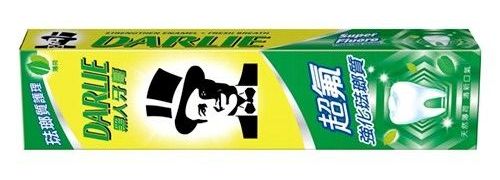Last month, a storied but perhaps unexpected corporation joined others in revisiting longstanding, racist brands. Colgate-Palmolive, a US company in existence for more than 200 years, was not targeting a local staple, however. Instead, its attention was focused on Hong Kong-based “Darlie” toothpaste, in which it acquired a 50% ownership stake in 1985. At the time, the brand was named “Darkie,” with a logo featuring a man in blackface. By 1989, Colgate and Hong Kong-based co-owners Hawley & Hazel had changed the name by a single letter, along with the logo, which now features a man of ambiguous race wearing a top hat. What didn’t change was the brand’s Chinese name, which, when translated, has remained “Black Person Toothpaste.”

Since the late 90s, Colgate-Palmolive Company–which, at 62% global household penetration, is one of the world’s top consumer goods brands–has quietly built a reputation for sustainability. Colgate started collecting and analyzing its energy use data in 1998, well ahead of peers. It likewise began reporting emissions to CDP very early, in 2004, and has been recognized for distinction by CDP in 7 different years since. Today, Colgate’s aggressive climate targets have been approved at a 2°C warming level by the progressive Science-Based Targets Initiative (SBTi), and the company also stands out via financial incentives for management to meet emissions and/or energy reduction targets, and oversight of climate issues at the board level.
Colgate is similarly progressive in other areas of environmental stewardship. Nearly 100% of the company’s pulp and paper is recycled or certified, it has near-term zero waste and net zero water targets, a goal of increasing the recycled content of its plastics to 25% by 2025, and a strong “no deforestation” policy covering palm oil, soy, pulp and paper, and tallow. The company is also part of AIM-PROGRESS, the Consumer Goods Forum, and the Supplier Ethical Data Exchange (Sedex), groups working to improve labor practices and eradicate forced labor in global supply chains.
Perhaps most surprising given its shared ownership of the Darlie brand, Colgate has a relatively strong record on diversity, equity and inclusion. The company has had a supplier diversity program since 1998, is featured on Diversity Inc’s list of Top 50 companies for Diversity, has a VP-level diversity officer, runs multiple diversity training programs and an internal leadership development program for Black leaders, and sponsors national employee resource groups including a Colgate Asian Action Network, Black Leadership Network, Women’s Network, Abilities Network, LGBT&A Network, and Hispanic Action Network, all of whose leaders make up the company’s Inclusive Leadership Council. Senior Management also runs separate, Diversity Leadership Councils, decision-making bodies made up of cross-functional management teams that help drive the company’s diversity and inclusion strategy. Finally, Colgate’s executive team and board are both made up of 40% women and 20% people of color, putting its leadership diversity solidly ahead of competitors (though still leaving room for improvement).
All this begs the question: how could a company with such a strong track record of social and environmental responsibility have continued to profit from a brand built on racist stereotypes? The brand’s location in China surely has something to do with it; with minimal contact with Africans (and on the mainland, Westerners) prior to the late 1990s, most Chinese were simply ignorant of the history of racial injustice behind the brand. In comparison to Aunt Jemima or Uncle Ben in the US, China’s Darlie had little trouble hiding in plain sight. And following the changes it made to the English brand name and logo, along with nuances of the Chinese name lost in translation, Colgate could plausibly claim that the brand had moved on. But in our view, and clearly now in the company’s as well, these qualifying factors were insufficient. Despite its 17% of sales in the Asia Pacific region, Colgate is making the right call by conducting a full review of the brand and potentially putting a significant piece of that revenue on the line.
When a company’s view of its stakeholders is as evolved and inclusive as Colgate’s, it can be easy to forget the importance of investors in continually pushing for change. The investor group Interfaith Center on Corporate Responsibility (ICCR) brought much of the pressure that led to the 1989 brand update, in which Colgate agreed to pay 100% of costs and compensate its co-owner for any lost revenue. Since then, ICCR has continued to promote changes to the brand. Today, Colgate owes its timely response in no small part to investors who prioritize racial equity in investment and engagement decisions. For our part, we continue to believe this exchange between investors and corporations is a critical ingredient for systemic change.


